Tri-County teacher receives National Excellence in Teaching About Agriculture Award
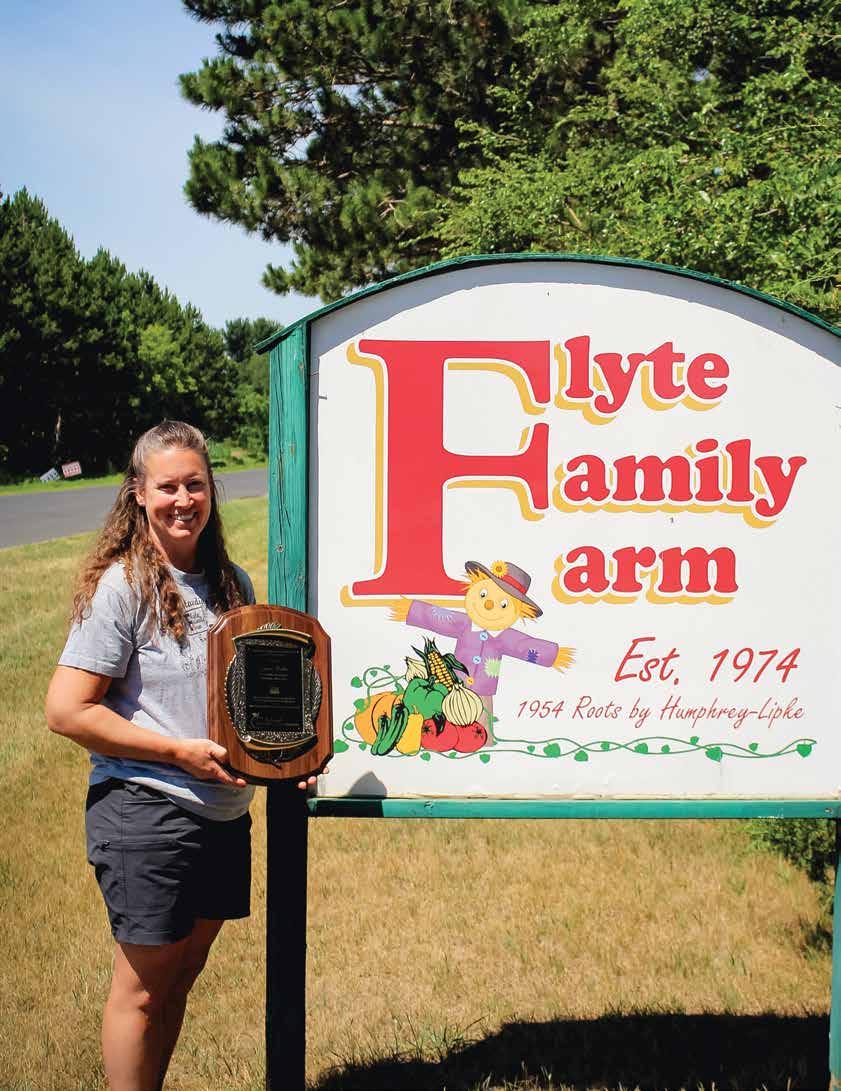
From Farm to School
Page 14 WISCONSIN FARM BUREAU FEDERATION®'S AUGUST SEPTEMBER 2023 • VOL. 29 NO. 4 | WFBF.COM
RuralRoute

POLICY SEASON IS HERE
Read this year's policy development issue backgrounders.
MEMBERS ADVOCATE
WFBF's Farm Bill and Dairy Working groups lobbied in Washington, D.C.
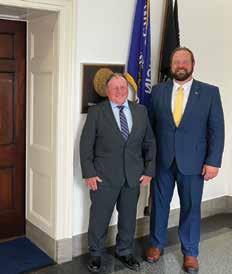
FROM FARM TO SCHOOL
Rettler receives National Excellence in Teaching About Agriculture Award.

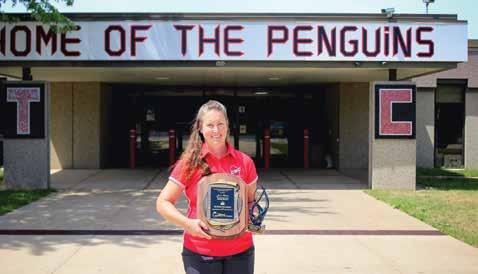
IT TAKES A TEAM
Preview this year's WFBF Annual Meeting and YFA Conference.
MEMBER BENEFITS
Learn how to save on vehicle rentals for your next vacation.
GRASSROOTS IN ACTION
Learn about the activities Farm Bureau has been up to locally.



VOICES
Columns from Krentz, Duvall, Gerbitz and Setzer.
GATHER
Delicious recipes to enjoy before the summer is over.
PICTURE THIS
Farm Bureau families celebrate summer on the farm.

AG IN
Wisconsin Ag in the Classroom Intern summarizes everything she has been up to.

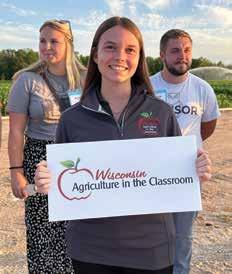
3 wfbf.com AUGUST | SEPTEMBER 2023 contents vol. 29 no. 4
RURAL MUTUAL Farmer mental health
counseling
6 8 24 33 26 22 17 14 37 39 45
PHOTO
HEIDI STREY stay connected WIFarmBureau ONLINE LIBRARY Read our previous issues at wfbf.com/read. CASSIE SONNENTAG 6 8 37 39 14
THE CLASSROOM
matters and
can help.
COVER
BY
Learning has been a theme the past few months as our household is attempting to teach a toddler new words, sounds and actions. When you have a little one in your life you literally can watch them process information. I have to admit, it’s a pretty cool part of parenthood.
We learn everyday whether we know it or not. Our experiences, day-to-day interactions and close peers influence us and help us grow. Lifelong learning is something we all have to embrace in order to take on the next chapters in our life.

What have you learned recently?
I learned recently that throwing a surprise party is a lot of work and might take years off your life, but totally worth it if it works out.
On a more serious note, during the past couple of months I have learned a lot about drought tolerant crops and crop stress in general from our farmers across the state.
Even within this issue, I learned that planful is a word.
I’d say in general, this issue has a theme of learning. The feature story, written
by one of WFBF’s awesome interns, Heidi Strey, is about a member who not only seeks out learning but teaches and influences a lot of people. Read about Jessica Rettler on page 14. I think you’ll enjoy learning about her.
In this issue you’ll also learn about the line up of events at this year’s Young Farmer and Agriculturist Conference and Wisconsin Farm Bureau Annual Meeting. The preview agenda and preliminary information can be found on page 17.
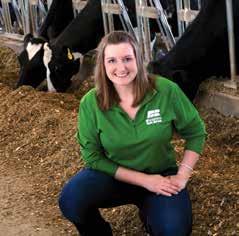
If you want to learn more about WFBF’s interaction with the Ukrainian embassy, you’ll want to read President Krentz’s column on page 26. Learning about their challenges had a big impact on the members who attended the last Washington, D.C., trip.
There’s no doubt you’ll learn about our hardworking volunteers in this issue. Through the magazine you’ll meet members doing amazing things in their communities.
Whatever your biggest take away is in this issue, I hope you learn something new. Whether it inspires you to try something new or makes you investigate something to learn even more, I hope your new knowledge helps you grow in some way.
It won’t be long and our kids and hardworking teachers will be headed back to school. When that time comes, we all learn that there is a season for everything and those summer nights will cool down quickly.
Enjoy the rest of summer and, as always, thanks for reading.
Amy Eckelberg Rural Route Editor Wisconsin Farm Bureau Federation
Editor
Amy Eckelberg - 608.828.5706
Designer
Lynn Siekmann - 608.828.5707
Contributors
Cassie Sonnentag - 608.828.5711
Rachel Gerbitz - 608.828.5709
Address of Publication
Wisconsin Farm Bureau Federation PO Box 5550
1241 John Q. Hammons Dr. Madison, WI 53705-0550
Postmaster: Send address changes to Wisconsin Farm Bureau Federation PO Box 5550 Madison, WI 53705-0550
Contact Information
608.836.5575
800.261.FARM (3276) wfbf.com info@wfbf.com
WFBF Board of Directors
Kevin Krentz, Berlin (President)
Joe Bragger, Independence (Vice President)
Dave Daniels, Union Grove
Arch Morton Jr., Janesville
Robert Nigh, Viroqua
Rosie Lisowe, Chilton
Brian Preder, Weyauwega
Ryan Klussendorf, Medford
Brad Olson, Frederic
Brenda Dowiasch, Augusta (Promotion and Education Committee Chair) Savannah Brown, Black River Falls (YFA Committee Chair)
Wisconsin Farm Bureau Federation’s Rural Route (ISSN 1082-1368) (USPS 39940), the official publication of the Wisconsin Farm Bureau Federation, is published six times per year in February|March, April|May, June|July, August|September, October|November and December|January. Subscription of $5 is included in Farm Bureau dues. Periodical postage is paid at Madison, Wisconsin. All rights reserved. No portion of this magazine may be reproduced in whole or part without written consent.
For advertising rates and information:
Wisconsin accounts contact Slack Attack at 608.222.7630 or barbara@slackattack.com. National accounts contact Casey McNeal at 800.798.2691 ext. 334 or casey@iafalls.com.
For general inquiries, contact Amy Eckelberg at 608.828.5706 or aeckelberg@wfbf.com.
4 WISCONSIN FARM BUREAU FEDERATION Rural Route
WISCONSIN FARM BUREAU FEDERATION’S
Rural
Route EDITOR’S NOTE
WFBF Applauds State Budget Passage

On July 5, Gov. Evers signed the $99 billion 2023-2025 State Budget into law.
Wisconsin Farm Bureau Federation extended their appreciation to both the state legislature and Gov. Evers for the significant investments made in rural infrastructure and the prioritization of items important to agriculture in this budget.
The top priority for WFBF was the $150 million in funding for the newly-created Agricultural Road Improvement Program. This funding aims to address the longstanding issue of deteriorating roads in rural Wisconsin, improving the efficiency of transporting agricultural goods and reducing costs for farmers and consumers.
To further assess the state of rural infrastructure, the budget included $12.5 million to inventory local bridges and culverts measuring 20 feet or less, an essential step to enhance safe, efficient transportation in rural areas. The Wisconsin Department of Transportation currently maintains an inventory of longer bridges.
Recognizing the importance of the meat and dairy processing sectors, the state budget allocated $2 million for meat processor grants and $500,000 per year for grants to dairy processors. These grants aim to bolster the competitiveness of these industries and provide necessary support to the farmers supplying them.
Agricultural exports received a boost with a $2 million allocation for the Wisconsin Agricultural Export Promotion program, to extend opportunities for farmers to reach international markets and showcase their products globally.
Farmers' mental health also received attention in the budget, with an allocation of $100,000 per year. This funding will support the Wisconsin Farm Center in providing resources to address the mental well-being of farmers and rural families.
Supporting conservation efforts by Wisconsin farmers, the budget allotted $1.6 million for cover crop
By Jason Mugnaini
rebates and maintained funding for producer-led watershed protection grants. The budget also allocated $2 million for nitrogen optimization pilot program grants aiming to promote sustainable farming practices. Finally, the budget allocates $200,000 per year for Targeted Runoff Management grants supporting localized solutions to water quality challenges.
Addressing the pressing issue of PFAS contamination, the budget allocated $125 million to address and mitigate its impact. Legislation containing details as to how the funds will be used is still making its way through the legislature.
The budget also set aside $1 million in 2024-25 for well compensation and well abandonment grants. An additional $6.5 million was allocated for abatement grants to help control rural nonpoint source water pollution.
The Wisconsin Livestock Identification Consortium received an additional $70,000 per year in funding, helping to maintain the state's commitment to livestock traceability and disease control.
Wisconsin’s Agriculture in the Classroom program, operated by WFBF to help educate students about agriculture and its significance, saw an increase in funding with an additional $50,000 per year. Finally, $3 million was reallocated to fund the Food and Farm Exploration Center in Plover to provide educational opportunities and showcase the importance of agriculture in the region.
With the budget now signed, WFBF looks forward to working with the state agencies and Gov. Evers to ensure successful implementation of these programs and initiatives. The investments made in rural infrastructure and agriculture are expected to have a lasting and positive impact on Wisconsin's farming communities and rural families.
5 wfbf.com AUGUST | SEPTEMBER 2023 ISSUES
Policy Season is Here
Each year, Wisconsin Farm Bureau members engage in discussions surrounding agricultural policy.
The WFBF governmental relations team assembles issue backgrounders each year to assist county Farm Bureau members in starting conversations at local policy development meetings. As members gather for policy discussions, these four topics are ones for consideration. Members are encouraged to review these topics prior to attending their policy development meeting.
Full issue backgrounders with discussion questions are available on these topics by visiting wfbf.com/policy/policydevelopment/policy-development-issue-backgrounders.
MANAGED FOREST LAW PROGRAM
The Managed Forest Law (MFL) program is a landowner incentive program that encourages sustainable forestry on private woodland. In exchange for following sound forest management, the landowner pays reduced property taxes. It was enacted in 1985 and replaced the Woodland Tax Law and the Forest Crop Law.
To participate in the MFL program, landowners designate property as ‘open’ or ‘closed’ to public access for recreation and commit to a 25 or 50-year sustainable forest management plan. The plan sets the schedule for specific forestry practices which landowners must complete. In return, MFL participants make a payment in lieu of regular property taxes.
Open designation allows public access to the property only for hunting, fishing, hiking, sight-seeing and cross-country skiing without additional permission from landowners. MFL land designated as ‘open” must be accessible to the public on foot by public road or from other land open to public access. All land enrolled in the MFL program must meet the access requirements for land designated as “open”, regardless of enrollment date. ‘Closed’ designation affords landowners the right to restrict access.
MFL lands receive modified tax status to sustainably grow timber for wood products. To qualify and comply with the law, the lands are restricted from other industry or land use. Prohibited usage includes, but is not limited to, agriculture, grazing, commercial storage facilities, game farms, cell towers, mines, quarries, orchards and recreational developments such as golf courses, campgrounds or raceways.
To help landowners get the most from their land, MFL plans contain recommendations related to forestry, wildlife, watershed,

endangered resources and aesthetics. The plan describes the property and spells out any mandatory forest management practices required during the MFL entry period. Landowners and their local Tax Law Forestry Specialist may adjust management plans as stand conditions, knowledge on woodland management and landowner objectives change. Mandatory practices are forest management practices that must be carried out during the MFL entry period.
DISCUSSION QUESTIONS: Currently municipalities retain 80% of the reduced property taxes collected on land enrolled in the MFL program. Should that percentage be increased? Under the MFL program, at least 80% of the acres must be covered by forest dedicated to growing commercial timber products. Should that percentage be increased? The program allows up 320 acres to be closed in a municipality; should that number be increased to allow for the municipality to collect the higher access fee? Should the Wisconsin Department of Natural Resources do more to enforce the current MFL requirements?
PROPERTY TAXES AND USE-VALUE
Property tax is the largest source of local tax revenue in Wisconsin. Prior to 1900, the property tax was the state government's largest tax. As the state's economy has diversified, state government has come to rely on other tax sources and has established various aid programs to reduce local reliance on the property tax.
The 1995 Act 27 provided for use-value assessment of agricultural land. Act 27 directed the Wisconsin Department of Revenue (DOR) to develop property tax formulas taxing this land at the value of its use, or the income it could generate if farmed, instead of its market value. Use-value is specific to land only and requires that the assessed value of farmland is based on the income that could be generated from its rental for agricultural use.
Income and rental from farming are a function of agricultural capability. Since any land can theoretically be used for

6 WISCONSIN FARM BUREAU FEDERATION Rural Route ISSUES
agricultural purposes, state laws and administrative rules limit the benefit of use-value assessment to land that is devoted primarily to a qualifying agricultural use.
The Farmland Advisory Council oversees agriculture usevalue. The Wisconsin Department of Revenue (DOR) Secretary chairs the ten-member council. These members represent agricultural, financial, academic, assessment, environmental and governmental interests.
The law was intended to keep land in production agriculture rather than be developed. In the mid-90s, high property values, leading to high property taxes, existed relative to low farm income. This scenario was forcing many farmers to sell land to developers, especially in growing suburban areas surrounding cities. Across Wisconsin, the effective annual property tax rate stands at 1.53%, the eighth highest among states. For context, homeowners in the U.S. pay an average of 1.03% of their housing value in property taxes a year.
DISCUSSION QUESTIONS: Does WFBF current policy cover possible changes or updates proposed by the Wisconsin state legislature? Are the current WFBF state policies still relevant to Wisconsin law? In what ways could use-value be updated in Wisconsin state law? Should there be changes to the Farmland Advisory Council? Agriculturally productive land continues to be converted away from farmland; is use-value achieving its goal of keeping land in production agriculture or should a new method by adopted? Does use-value put an undue burden on rural units of government because of the lack of property taxes collected? Should the legislature invest more in the shared revenue formula to compensate rural local governments for use-value?
SOLAR SITING AND ADVERSE AGRICULTURAL IMPACTS IN WISCONSIN

In Wisconsin, the Public Service Commission (PSC) regulates the construction of solar energy generation facilities. Under Wisconsin state law, no person may construct an electric generation facility without first obtaining approval from PSC. For the large projects (greater than 100 megawatts), a public utility must obtain a Certificate of Public Convenience and Necessity (CPCN) (s. 196.491). For smaller projects, a public utility must obtain a Certificate of Authority (CA) (s. 196.49).
The application requires a description of potential impacts to current agricultural practices in the project area, describe impacts to farming operations, certain agricultural systems, farmland loss, agricultural facilities, and any agricultural incentive program participation within the project area. Furthermore, the application requires a description of the process for potentially restoring land to agricultural use after decommissioning and any induced voltage issues.
While all large solar energy generation facilities being required to obtain a CPCN prior to construction, wholesale merchants are exempt from certain review requirements. A wholesale merchant does not consider alternative sources of supply, economic and engineering factors, project’s cost to ratepayers, or the facility’s necessity to the public’s energy needs, but they are not exempt from potential agricultural impact descriptions required in the application.
Although, due to the nature of the lease contracts and statutory conditions under current Wisconsin State Law (s. 32.035), the review requirements for a CPCN, for both public utilities and wholesale merchants, do not require the submission of a full Agricultural Impact Statement. If a solar energy generation facility were to exercise eminent domain or a project impacted 5 or more acres of land taken from a farm, then the Department of Agriculture, Trade and Consumer Protection (DATCP) would be required to prepare a full Agricultural Impact Statement (AIS) as a condition of the application. Conducting an AIS would provide a greater level of analysis on the impact to agriculture than the current application requirements, as well as provide recommendations from DATCP experts to the PSC and applicants to mitigate agricultural impacts of the project.
Over the past few years, Wisconsin has experienced a significant rise in the establishment of large scale solar energy generation facilities. These advancements have sparked various public reactions. While some applaud the transition to renewable energy sources, others express concerns regarding the impact and oversight in siting of these facilities on agricultural land.
DISCUSSION QUESTIONS: Are the current processes for review and approval of solar energy generation facilities meeting the needs of the agricultural community? Should Wisconsin State Law require an Agricultural Impact Statement (AIS) in order to obtain a CPCN to construct a solar energy generation facility? Are the contents currently required for an AIS sufficient to consider the true impact that a solar energy generation facility could have on the agricultural community? Should the requirement to prepare an AIS be extended to be required for any energy generation project impacting a farming operation that needs a CPCN? Should siting of solar energy generation facilities be required to avoid high-quality farmland and soil-types, to the extent practicable? Should a public utility be required to address the review requirements the wholesale purchaser was exempted from when purchasing or acquiring a solar energy generation facility?
7 wfbf.com AUGUST | SEPTEMBER 2023
Members Advocate for Farm Bill in Washington, D.C.
 By Tyler Wenzlaff
By Tyler Wenzlaff
The farm bill is a massive spending bill governing policy in many areas related to the agriculture sector that must be renewed every five years. This gives lawmakers the opportunity to regularly address agricultural policy issues.
The farm bill holds a lot of statutory power but also has a little something for everybody. From farm program payments and food policy to conservation initiatives and rural development, the farm bill provides mandatory and discretionary funding for many everyday programs and functions whose influential impact carries across social demographics and regions.
Farm bill passage and implementation has a unique timeline with serious consequences if lawmakers fail to adhere to it. Its five-year lifespan provides lawmakers the opportunity to update the programs so they are relevant to current market and economic conditions. There have been 18 farm bills since the 1930s.
If the farm bill were to expire without a new bill in place or if programs were not granted an extension by Congress, all the programs would return to the 1949 bill, meaning reverting to support price programs for the limited number of commodities covered by the 73-year-old law. Adjusted for inflation, these support prices would be far above even the current elevated market. This helps drive the urgency farmers – and Congress –
feel about passing this legislation in a timely manner.
Having worked on the farm bill priorities over the last six months, Farm Bill and Dairy Committee members were uniquely qualified to speak to legislators. Members began their trip with an update from American Farm Bureau staff members. The WFBF board and members were updated on AFBF farm bill priorities, environmental issues, trade, livestock, dairy and received a crash course in effective advocacy.
Members then put their advocacy skills to work meeting with legislators on Capitol Hill. Members met with Rep. Tiffany, Grothman, and staff members from Rep. Fitzgerald, Gallagher, Steil and Van Orden. To cap the day off, members met with Sen. Baldwin and Sen. Johnson.
The cornerstone meeting of the trip would happen on the morning of the third day when members met with Ukrainian Ambassador Oksana Markarova.
The embassy is located in the Georgetown area of Washington and the building has some interesting history of its own. The embassy occupies the Forrest-Marbury House, originally built in 1788, and owned by General Uriah Forrest. Forrest was one of the leaders in the effort to establish the American Capitol in the area. On March 29, 1791, he hosted George Washington and other dignitaries in a dinner that marked the agreement in principle to establish the new capitol.
8 WISCONSIN FARM BUREAU FEDERATION Rural
Route
WISCONSIN FARM BUREAU BOARD DIRECTORS AND MEMBERS OF WFBF’S FARM BILL AND DAIRY WORKING GROUPS VISITED WASHINGTON, D.C., FROM JUNE 5-7. PART OF THE MEMBERS’ COMMITMENT TO THE GROUPS WAS GOING TO D.C. TO LOBBY WISCONSIN’S FEDERAL LEGISLATORS ON THE FARM BILL PRIORITIES THEY WORKED ON.
In 1800, the house was purchased by William Marbury, a prominent ally of President John Adams, best known for his role in Marbury v. Madison. The house remained the home of the Marbury family until 1891, when the changing character of the neighborhood led John Marbury Jr. to turn it into a commercial property.
In 1986, the building was bought by a developer, refurbished, and restored to its original condition. On Dec. 31, 1992, the newly independent Ukraine purchased the building to house its embassy.
Ambassador Markarova gave updates on the RussianUkrainian war and how Ukrainian farmers are proceeding with farming in an active war zone. She gave stirring updates on the devastation to families, farmland and infrastructure. Through extreme conditions, Ukrainian farmers are still able to produce food to feed the local population and, when allowed, export goods across the Black Sea and over rail as transportation infrastructure has been heavily targeted by Russian forces. According to the Ambassador, rail lines are often in better condition than roadways.
Ukraine agriculture is not all that dissimilar to Wisconsin’s as the country produces corn, soybeans and wheat. The country is the world’s sixth-largest corn producer and is forecasted to be
the fourth largest exporter with 32% destined for China. The remaining exported corn goes to the European Union.
Ukraine farmers are the world's ninth-largest producers of soybeans. They have a similar production timeline to Wisconsin with planting occurring in April and continuing through May. Harvest occurs in August and September with a majority of the production concentrated in central and western regions of the country.
It was very clear that Ukrainian farmers are working through extreme conditions. The farm bill is still several months away from being voted on by Congressional committees but individual provisions are starting to become more clear. There has been a developing consensus among agricultural groups that the latest iteration of the farm bill will be more evolutionary then revolutionary. Many of the provisions from the last farm bill still enjoy large support from commodity groups. A divided Congress and tight budgetary restrictions add to the feeling that the next farm bill will build on the success from the 2018 Farm Bill.
The next farm bill must be reauthorized by Sept. 30 and WFBF will continue to work with Wisconsin’s federal delegation to emphasize our farm bill priorities.




 Members met with Sen. Baldwin while visiting Washington, D.C.
Members met with Rep. Gallagher's staff member Dan Butler.
The group stood for a photo with Sen. Johnson after meeting with him and his staff.
Members met with Rep. Van Orden's staff member Claire Osborn.
WFBF Board Directors Dave Daniels and Joe Bragger met the Ukrainian Ambassador.
By Tim Fiocchi
Members met with Sen. Baldwin while visiting Washington, D.C.
Members met with Rep. Gallagher's staff member Dan Butler.
The group stood for a photo with Sen. Johnson after meeting with him and his staff.
Members met with Rep. Van Orden's staff member Claire Osborn.
WFBF Board Directors Dave Daniels and Joe Bragger met the Ukrainian Ambassador.
By Tim Fiocchi
Finally Fixing Farm Roads New $150 million Ag Road Program and Increased Aid for Local Governments

The broken-down condition of our rural town and county roads has been a long-standing problem for Wisconsin farmers. A decade ago, the legislature attempted to address the problems created by the disparity between the modern agricultural equipment farmers were investing in to stay competitive and the roads outside the farms that the state was not investing in. This was done by updating our antiquated regulations on implements of husbandry. While the update was overdue, the discussion failed to address the elephant in the room – these roads need to be fixed and modernized if rural Wisconsin’s economy is to succeed.
In recent years, the crumbling state of rural roads has started to get attention in Madison with new funding directed toward existing local aid programs at the Department of Transportation, but those programs prioritize funding the highest traffic routes for commuters, not farm roads. This year, that is finally starting to change.
Legislation requested by Wisconsin Farm Bureau and the groups within the Ag Coalition to create an Agricultural Road Improvement Program (ARIP) focused specifically on modernizing infrastructure in farm country was introduced the day before Ag Day at the Capitol in. The bill, authored by Sen. Howard Marklein, Sen. Cory Tomczyk and Sen. Joan Ballweg, and Rep. Travis Tranel and Rep. Nancy VanderMeer, was passed and signed into law by Gov. Evers as Act 13 in June. The $150 million for the program was included in the state budget, along with historic investments in state aids to local governments, and an increase of more than $360 million for local roads and bridges. These investments, along with the use of federal money from the Bipartisan Infrastructure Law, have put Wisconsin in a
position to make real investments in rural infrastructure.
Farm Bureau will be working closely with the DOT to implement the new law. The department is starting work on the application and approval process for the grants, and more information will be forthcoming, but for now farmers and local governments should look at routes that may be good candidates for the new grant program.
The ARIP program is modeled on existing programs at the DOT that provide state assistance for local road projects but with specific metrics to ensure the funding will go to routes that currently create the greatest barriers for agriculture. To be eligible for a grant under the program a route or structure must have been posted for weight for at least one month in the previous year, be maintained by a local government, and provide access to agricultural lands or facilities.
ARIP grants will be awarded on a competitive basis prioritizing projects that have the greatest positive economic impact for agricultural operations. Elimination of redundant trips, allowing equipment to go from point A to point B without lengthy detours and limiting fuel, labor, and other costs to farmers will all be factors in the grant process.
The original bill would have created a 100% state funded program, but the final bill included a 10% matching requirement for local governments. While some may see this as a deterrent for locals to take advantage of the program, in the context of the historic investment in additional shared revenue and the fact that this remains the most generous grant program DOT has, we expect to see a great deal of interest in the program.
WFBF will provide updates for members as work on program implementation moves forward.
10 WISCONSIN FARM BUREAU FEDERATION Rural Route ISSUES
WHO SHOULD ATTEND?

WHY SHOULD YOU ATTEND?


11 wfbf.com AUGUST | SEPTEMBER 2023
11-12, 2023 Day One – October 11 9:00 a.m. Introductions The Candidate • Evaluate the candidate and the electorate • Candidacy announcement and filing • Role of candidate’s spouse and family 12:00 p.m. Lunch 1:30 p.m. The Issues • Selecting the campaign theme • Selecting the campaign issues • Crafting your message • Communicating with voters The Money • Budget preparation • Raising money • Using a finance committee • Government reports 4:00 p.m. The Media • Mock interviews Day Two – October 12 8:00 a.m. Continental breakfast 8:30 a.m. The Media • Review mock interviews. The Organization • Campaign structure • The role of the campaign manager • The use of support committees • Operations and resources • Earned media • Promotion activities • Volunteer recruitment and coordination • Allies and coalitions 12:00 p.m. Lunch The Strategy • Identify the voters • Targeting precincts • Targeting special interest groups • Developing a calendar to WIN • Using polls • Election day activities
CAMPAIGN SCHOOL October
AGENDA
Current officeholders Potential candidates Campaign managers Campaign volunteer leaders
Learn the nuts and bolts of campaigning Receive non-partisan, unbiased guidance Participate in a program with a 78% national win percentage Gain confidence to execute a winning campaign AMERICAN FARM BUREAU Wisconsin Farm Bureau Federation Office • Madison For more information, visit wfbf.com/events/campaign-school.
Hromyak Hired as Foundation Director
John Hromyak has been hired by the Wisconsin Farm Bureau as its Foundation Director.
Hromyak will be responsible for strategizing, overseeing and managing the operations of the Wisconsin Farm Bureau Foundation.
“I’m excited to join the Wisconsin Farm Bureau team and look forward to working with donors and partners across the state,” Hromyak said. “It’s an honor to support programs that benefit farmers and Wisconsin’s agricultural industry.”
Hromyak joins Wisconsin Farm Bureau with more than




a decade of experience in nonprofit fund development and marketing programs. He earned a bachelor’s degree from UWMadison and a master’s degree in business administration from Edgewood College.
Hromyak previously served as the Executive Director of the Wisconsin FFA Foundation and most recently as Director of the Agrace Hospice Care Foundation.
“John’s experience with fundraising will be a huge asset for the Wisconsin Farm Bureau Foundation,” said WFBF Chief Administrative Officer Bradley Uken. “John brings a wealth of knowledge for building a brand, which will be a valuable skillset as he starts this position.”
Hromyak began his role on July 24.
12 WISCONSIN FARM BUREAU FEDERATION Rural Route NEWS
SUBMITTED PHOTO
"It’s an honor to support programs that benefit farmers and Wisconsin’s agricultural industry."


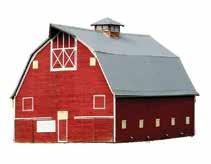



13 wfbf.com AUGUST | SEPTEMBER 2023
Agriculture Award
By Heidi Strey
As soon as school is out for the summer, you can find Jessica Rettler tending to the vegetable fields on her family’s farm, attending her kids’ various summer activities and playing an active role in her community.
“Everyone always tells me, ‘Oh, you’re a teacher! You must enjoy your summers off’,” said Jessica. “'Off' is not really the case.”
This summer, Jessica added another item to her list of adventures. She traveled down to Orlando, Florida, to receive the 2023 National Excellence in Teaching About Agriculture Award and continued her education to incorporate further Ag in the Classroom lessons.



It Begins on the Farm
Farming has always run in Jessica’s veins. Her grandparents started farming followed by her parents, brothers and now her own children. Flyte Family Farm is rooted in family traditions, community involvement and a whole lot of vegetables. Jessica recalls spending her high school summer vacations out in the vegetable fields. Her grandma would bring the whole family a hearty lunch every day to keep them fed and energized.
“It’s a family thing,” Jessica said.
They even set aside a few hours every Sunday for quality family time. The family plays kickball, goes kayaking, rides horses and more.
Jessica’s and Matt's daughters Karissa, Makenna, Addyson and Elliana have all developed their own love for agriculture. They help on the farm, deliver vegetables to the markets and take care of their 4-H projects. The girls show pigs, sheep, cattle and, of course, vegetables at the county fair. Addyson even has her own herd of Mini Herefords.
Located in Coloma, Flyte Family Farm started with many fresh market vegetables that has since expanded to berries,
cash crops, and a more diversified market vegetables. The farm is about 500 acres filled with asparagus, zucchini, broccoli, eggplants, gourds, squash, cabbage, onions, tomatoes, peppers, Brussels sprouts, muskmelon, pumpkins, cauliflower, green beans, cucumbers, potatoes, sweet corn and field crops. Some acres on Flyte Family Farm Too and Pleasant Prairie Acherz are even organic!
The vegetable planting process starts in mid- to late-April. The vegetables are planted throughout the following weeks depending on their growing season and harvesting starts throughout the summer and lasts until the end of September. When pollination is in full swing, bees are shipped to the farm and hives are placed around the fields. Every few weeks, a local beekeeper collects the honey.
Jessica’s parents, Lee and Cheryl, brothers and their wives, JR and Kristen, and Adam and Carrie, and their children play a huge role in the farm’s success. JR manages the vegetable crop and Adam runs Flyte Family Farm Too and Flyte’s Fieldstones, entities of Flyte Family Farm. Here, Adam and Carrie own and rent over 3,500 acres of cabbage, potatoes, and cash crops, raises
14 WISCONSIN FARM BUREAU FEDERATION Rural
Route
beef cattle, and grows pick-your-own strawberries, blueberries and raspberries. They also have hydroponic greenhouses on the farm that grow cucumbers, tomatoes and starter plants. Vegetables left over from both farms are added to a TMR to be fed to the cattle. JR and Adam work closely together every year to plan out crop rotations between field crops, vegetables and berries.
Bringing the Farm to the Classroom



Jessica knew she wanted to become a teacher from an early age. She was inspired by her mom and grandma who taught.
When Jessica graduated high school, she attended UWStevens Point for her undergraduate degree and continued her education at UW-Oshkosh for her masters.
After graduation, Jessica started teaching at Wautoma Area School District as a Spanish teacher. The next year she accepted a position at Tri-County Area School District and has been there ever since. Jessica has taught fourth grade for 22 years but will be moving to seventh- and eighth-grade math this fall.
A few months ago, Jessica received word from the principal that she needed to bring her students down to the auditorium immediately. When she arrived, she found her family, coworkers and all the students at the school all waiting for her. There, they presented her with the 2022 Wisconsin Ag in the Classroom Outstanding Teacher Award.
“I didn’t know much about this award, but it was truly an honor,” Jessica said.
After she received the state award, Jessica applied to represent Wisconsin at the national level. She spent many hours writing the application, sending in photos of her classroom and farm, and reflecting on her role in agriculture. In April, she was notified that she received the 2023 National Excellence in Teaching About Agriculture Award.

“I was ecstatic!” said Jessica.
She traveled to Orlando, Florida with her husband Matt, daughters, parents and a few family friends to receive the award.
“The award itself was very humbling and it was a highlight to represent Wisconsin,” Jessica said. “Ever since I received the award, people have been so kind promoting it and wishing me congratulations.”
Jessica’s 23 years of bringing agriculture into the classroom was well rewarded this past year. She continues to help her students strive for success and brings them rewarding experiences from her family farm.
During class, Jessica brings in vegetables and fruits for experiments and research, participates in an adopt-a-cow program and has brought students to her farm in previous years. She loves the Into the Outdoors program.
“A big component of teaching is out of the classroom learning,” said Jessica. “It really adds a lot of value.”
Jessica is also an avid user of the Ag in The Classroom
15 wfbf.com AUGUST | SEPTEMBER 2023
Jessica picking blueberries at Flyte Family Farm Too.
A portion of the irrigation system used to water the vegetable fields.
One of Jessica’s daughter’s sheep that was shown at the county fair.
continued on page 16
Fresh picked blueberries and strawberries awaiting customers at Flyte Family Farm Too.
continued from page 15
Curriculum Matrix. She finds valuable agricultural lessons and incorporates them into her daily class routine.
After school, Jessica coaches the school’s volleyball team. She brings items from the farm, such as watermelons, and does fun team building activities with them. In all aspects of Jessica’s life, her goal is to spread her agricultural knowledge and make an impact on her students.
Jessica’s school, Tri-County Area School District, works closely with Flyte Fieldstone Farm to provide fresh and local vegetables through the Fresh Fruit and Vegetable Grant. The food service employees do an excellent job preparing meals with local vegetables and providing each student with a nutritious school lunch.
“When the truckload of vegetables comes to the school, the kids are so eager to help unload it,” said Jessica. “It is a great connecting and learning experience about the farm to table process.”
Extending to the Community

Jessica was raised to be community minded.
“I always think to myself how can I help or be of service,” she said.
Right now, Jessica is serving as the Waushara County 4-H Leader, plays an active role in the Central Wisconsin Rural Safety Day and the Coloma Dynamites 4-H Club Leader. She uses her talents to edit, revise, and pilot lessons for the Farming for the Future Foundation.
Since Jessica and her family have exemplified leadership in their community, they were chosen to be featured at the new Food and Farm Discovery Center in Plover. This interactive exhibit will teach consumers about the farm to fork process within the local community.
Jessica and her family have shown true dedication to agricultural education through the farm, school and their community. It is a lasting impact that has reached lives of those around them.
"I love opportunities where I can share my passion on and off of the farm,” Jessica said.
She continues to search for these opportunities every day and brings light to the future of agriculture. Bob Wdell, a farm employee, said it best, “They are truly a wonderful family.”
16 WISCONSIN FARM BUREAU FEDERATION Rural Route

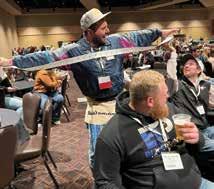

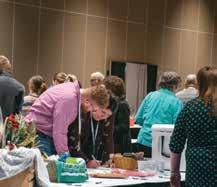
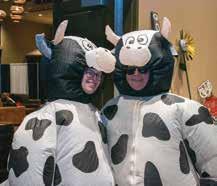

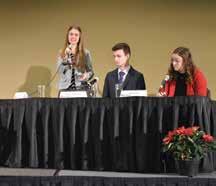
17 wfbf.com AUGUST | SEPTEMBER 2023 December 1-4, 2023 • Wisconsin Dells 104th Wisconsin Farm Bureau Federation Annual Meeting Young Farmer and Agriculturist Conference 89th Rural Mutual Insurance Company Annual Meeting Insurance Company Rural Mutual WFBF Annual Meeting and YFA Conference | December 1-4, 2023
SPEAKERS
Saturday Morning
Kiah Twisselman Burchett
Kiah Twisselman Burchett, better known as Coach Kiah, is a California cattle rancher turned motivational speaker, life coach, and podcaster on a mission to empower others to love themselves deeper, care for themselves better, and find joy in this messy, beautiful journey of life. After battling with her own weight and body image from a young age, she embarked on her own personal health journey losing over 100 pounds, but more importantly, the mental weight she had been carrying with her for years. Named one of Cowgirl Magazine’s 2023 Top 30 Under 30, Coach Kiah uses her vulnerability and infectious energy to show others how to overcome hardships, cultivate confidence, and become the main characters in their own lives.
Sunday Morning Brooke Didier Starks
Brooke Didier Starks' lawyer life finds her discussing death, taxes, and difficult family dynamics daily, which could sound depressing unless you know how rewarding it is to be invited into the living room of people's lives. She owns and operates Legacy Legal, a boutique estate planning firm that caters to farm families and entrepreneurs. Having grown up in rural Illinois, Brooke leans on her small-town roots, humor and down-to-earth style to complement her decades of legal expertise and connect with audiences. One of her most treasured compliments is "no one ever explained it like that before." She strives to break down hard topics into bite-size pieces and find solutions to situations that families think are impossible. Brooke lives in rural Illinois with her husband and two teens. She is the co-founder of 5 Things, a company that facilitates networking events for professional women. She volunteers regularly with United Way and her local church. For fun, she likes jogging, hiking, winning at board games, trying her hand at cooking (but not cleaning), and visiting places she's never been.

WORKSHOPS
Saturday 2:00 p.m.-3:00 p.m.
• Shoppers in the Know: A Panel on Consumer Marketing
• Time Management Tips & Techniques
• Farm Bureau Policy & Governmental Relations 101
• The Rise to Management
• Hands-On Farm Safety 3:15 p.m.-4:15 p.m.
• Female Leadership in Agriculture

• Wrestling with Volatility
• The Farm Bill: What's in it for me?
• Ultimate Domination: Collegiate Ag Olympics
• Hands-On Farm Safety
Sunday (1:30 p.m.-2:30 p.m.)
• Unstock: How to Prep for Estate Planning at Every Stage
• Sustainability and CPG Companies
• Creative Farm Financing: Non-Bank Options to Capitalize Your Farm Business
• Value Added Revenue; On-Farm Agricultural Tourism
• Solar Energy
Sunday Exhibitor Mini-Workshop (2:30 p.m.-4:30 p.m.)
• Overview of Farm Service Agency Programs
• Gather Wisconsin
• Benefits of WI Water Quality Trading Clearinghouse
• Mental Heath
18 WISCONSIN FARM BUREAU FEDERATION Rural Route
Friday Evening Union Road
Let’s turn back the clock and celebrate the top tunes of the 1980s. Members will enjoy a fun night of music featuring the popular cover band, Union Road.

Saturday Evening Ross Bennett, Comedian
Ross Bennett left the U.S. Military Academy after deciding that he preferred to take aim and fire jokes instead of bullets. Since that day Ross' comedy career has taken him from New York to Los Angeles and all points in between. Ross has developed a brand all his own described as "Comedy For The Rest Of Us" which resonates with everyday working class Americans who prefer clean humor that is both clever and politics-free. Ross discusses a wide variety of topics drawn from a life full of experiences ranging from his growing up with a father who was a Marine Colonel, to grade school snow days, to middle age medical procedures. Ross has been seen on over a dozen television shows including Comedy Central's "Tough Crowd With Colin Quinn", A & E's "Evening At The Improv" and "The Late Show with David Letterman”.

YFA 80s NIGHT


Get ready for a totally tubular time! On Friday night of the YFA Conference, attendees are encouraged to channel the spirit of the 1980s by dressing their best in neon colors, acid-washed jeans, patchwork leather, jumpsuits, geometric prints and denim jackets. Don’t forget the teased hairstyles, sweatbands and fanny packs. Prizes will be awarded for:


1. Biggest Hair
2. Best Dressed – Female
3. Best Dressed – Male
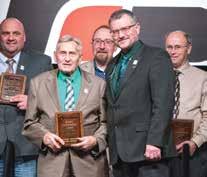
4. Best Dressed – Couple/Group


19 wfbf.com AUGUST | SEPTEMBER 2023
Registration materials coming soon. Watch wfbf.com for more information.
ENTERTAINMENT




20 WISCONSIN FARM BUREAU FEDERATION Rural Route

Farm Bureau Member Saves When Traveling

Lafayette County Farm Bureau member Christina Benson doesn’t leave for vacation without her Farm Bureau member benefits.
“Some of my family lives out east and some down south,” Christina said. “So, the travel benefits of car rentals and hotel discounts help me save money when I head out to see them.”
Christina shared she usually books everything online and it’s simple to apply the discount. She most recently used her Budget car rental member benefit in June 2023 to visit family.

“I usually save between $75 and $100 each time I use it which is about twice a year,” Christina said.
Wisconsin Farm Bureau members can save up to 35% off on Avis and Budget base rates. In addition, enjoy additional offers like dollars off, a complimentary upgrade or a free weekend day. For information on Avis rentals, visit avis.com/wifb or call 800.331.1212. For Budget information visit budget.com/wifb or call 800.218.7992.
Christina is a personal banker and bank manager. She serves as the Lafayette County Farm Bureau president and is enrolled in the current WFBF Leadership Institute class.
“I will continue to pair the rental savings with my travel car to get the best value when traveling,” she added.
It’s important to note the Farm Bureau discount for Avis or Budget may NOT be stacked with other AWD corporate or membership discounts. More information on Wisconsin Farm Bureau member benefits can be found at wfbf.com/ membership/member-benefits.


22 WISCONSIN FARM BUREAU FEDERATION Rural Route
SUPPLIED PHOTO MEMBER BENEFITS















Insurance Company Rural Mutual *WFBF member benefits may be changed or discontinued at any time without notice.* Learn more about your Farm Bureau member benefit savings by scanning the QR code or visiting wfbf.com/membership/member-benefits. Get the MEMBER BENEFITS MOST out of EVERY DOLLAR with your FARM BUREAU Wisconsin Farm Bureau members qualify for a variety of membership benefits and discounts that serve the needs of farmers, families and businesses in Wisconsin. Member Protector Policy
Grassroots in Action
Farm Bureau prides itself on being a grassroots organization. Members belong to one of the 61 county Farm Bureaus. Throughout the state, local members advocate for Farm Bureau and agriculture in a variety of ways. Here are some of the activities and projects happening locally.
Jefferson County Farm Tour

The 28th Annual Jefferson County fourth grade farm tour was held on May 3. The event hosted 24 public schools and two home school groups with 767 students, 41 teachers and 150 adult chaperons. Students visited 11 different agricultural stations at 10-minute intervals. Lunch was provided and each teacher received the Wisconsin Ag in the Classroom 2023 Book of the Year, “Tales of the Dairy Godmother – Chuck’s Ice Cream Wish”. Since its inception, the farm tour has hosted 16,984 students and 2,708 adults.
Eau Claire County Trees, Bees and Cheese Celebration
Eau Claire County Farm Bureau celebrated National Pollinator Week and June Dairy Month by sponsoring an information booth at the First Annual Trees, Bees and Cheese celebration on June 22 at Beaver Creek Reserve in Fall Creek. The activity included various booths by pollinator supporters including Department of Natural Resources, The Prairie Enthusiasts, Trout Unlimited and the Natural Resource Conservation Service. Participants were given more than 90 minutes to visit the booths, one hour of a landowner panel discussion and a pollinator habitat field tour. More than 90 people participated in the event.
Marquette County Dairy Parade Float
The Marquette County Promotion and Education committee organized a float for the Westfield Dairy Delicious parade held on June 10. The committee made an agriculturalrelated float and handed out string cheese to parade attendees.

Columbia County Moo Day Brunch


On June 17, Columbia County Farm Bureau held a milk tasting at the Columbia County Moo Day Brunch. More than 100 people stopped to try different beverages including 2%, lactose free milk, 2% milk and A2 milk, along with almond and oat beverages. Overall, there was a friendly audience and some good questions. People were intrigued by the A2 milk. This was a great opportunity to help educate the public about the difference between milk and other beverages.

Manitowoc County EMS Training
Manitowoc County Farm Bureau provided area Fire and EMS personnel with safety training on several agricultural hazards on May 20. Training was provided by Northeast Wisconsin Technical College for more than six area volunteer fire departments.
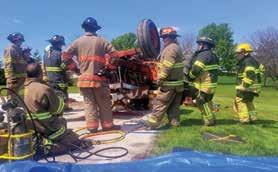
Marinette County Farm to Table Promotion
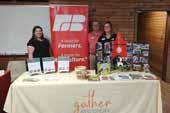
Marinette County Farm Bureau created a Farm to Table locations poster with a list of local farms that direct market product to consumers from their farms in the county to display at the Marinette County Breakfast on the Farm on June 25. The poster will
the year.
 be displayed at other events throughout
be displayed at other events throughout
24 WISCONSIN FARM BUREAU FEDERATION Rural Route
District 8 Farm Neighbors Care Project
Since 2019, the county Farm Bureaus in District 8 have partnered with Zinda Insurance Group to deliver more than 400 care packages to farmers throughout the area. The goal of this project is to thank hard-working farmers for all they do and to let them know that their local Farm Bureau and Rural Mutual Insurance agents are here for them. This year the care packages included string cheese, chips, granola bars, water, water flavor packet, craisins, beef sticks, safety glasses and ear plugs, along with heart health information courtesy of Aspirus Hospital.
Rock County Spring Planting Tour
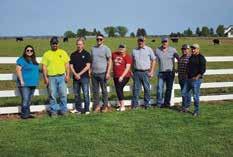
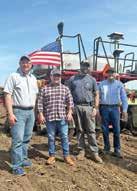
Dunn County Farm Night at the Speedway
On June 2, Dunn County Farm Bureau partnered with Advanced Dairy, Dunn County Dairy Promotion, Kitchner Farms, and 715 Ag Supply and Grain Storage Systems to kick off June Dairy Month with Farm Night at the Red Cedar Speedway in Menomonie. Winners in each feature class took home a custom milk can trophy.

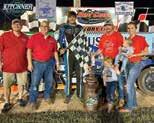
Langlade County Music in the Park
On June 5, Langlade County Farm Bureau supplied a meal and refreshments for about 500 community members who attended the Music in the Park series that night in Antigo. The successful event served not only as a fundraiser but also as a beef promotion opportunity.
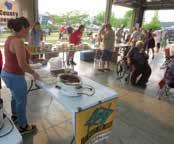

District 8 Pollinator Kit Project


Rock County Farm Bureau held its inaugural spring planting tour for WFBF staff members and Rural Mutual agents on May 11. Participating staff members and agents toured farms on both the east and west sides of the county and had an opportunity to ride along on a soybean planter. The purpose of the event was to provide new WFBF staff members and Rural agents with an opportunity to experience the farm firsthand and to develop relationships with Farm Bureau members.
Waupaca County FFA Listening Session

Waupaca County Farm Bureau held a special meeting with the New London FFA to give the FFA members a chance to practice their interactive competition presentation prior to the Wisconsin State FFA Convention. The New London FFA students won the state competition and are headed to compete on the national level.
Through a partnership with Gather Wisconsin, pollinator kits were recently distributed to county Farm Bureaus in District 8 to provide information to consumers and sustainability in agriculture at local events. The kits included a supply of custom bookmarks with the Gather Wisconsin logo and website and an assortment of wildflowers. Children were encouraged to answer questions about pollinators prior to filling their baggy with potting soil, a compostable pot and their bookmark.
Sauk County Wisco Wine and Cheese
On June 15, Sauk County Farm Bureau's Promotion and Education committee partnered with Balanced Rock Winery in Baraboo to host Wisco Wine and Cheese. The event was open to the public and featured Sauk County cheesemakers Carr Valley and Cedar Grove, wine from the host venue and sausage from local Farm Bureau member Wilkinson Farm. The event featured unique cheeses such as butterkase, havarti and fontina to give participants a glimpse into the variety of cheeses produced within the county. As the inaugural event, it was a success with 50 participants, mostly general consumers without a direct connection to agriculture. It was a great way to celebrate June Dairy Month and enjoy delicious Wisconsin cheese.

25 wfbf.com AUGUST | SEPTEMBER 2023
Challenges Abroad Give Perspective
A Message from WFBF President Kevin Krentz

cannot fathom farming in a war zone. This, however, is the reality for farmers in Ukraine.
A group of Farm Bureau members along with the Wisconsin Farm Bureau Board of Directors recently traveled to Washington, D.C. While there, the group had the experience of visiting the Ukrainian Embassy.

Ukrainian farms have been heavily affected by the war but the resilience to continue to grow food for their people is remarkable. We met with Ukraine's Ambassador to the U.S. Oksana Markarova who explained the emotional turmoil citizens and farmers in her country are experiencing.
to farmers across the globe. Farmers, in general, work alone and have an attitude of taking care of things themselves. Ukrainian farmers have a lot of weight on their shoulders as they care for their farms and families. The Ambassador spoke of the challenge of supporting their farmers as they struggle emotionally and mentally from the effects of war.
Farmers of Ukraine are resilient and steadfast, but Ukraine will need help rebuilding their country and feeding their people. The war has impacted far more than the region. With the rich, productive soils in the area, the Ukraine war has had real impact on global food prices and global food security.
Imagine not having enough people to help care for livestock or crops. Or not being able to get parts for a tractor or fertilizer for fields.
When the crop is produced, infrastructure is not there for it to move to market.
And when the product finally is sold, it may be at a price the farmer cannot live on.
Now imagine having the challenges above while being shot at or farming fields with exploded and unexplored artillery.
Farmers across the globe deal with depressed prices, supply chain issues and aging infrastructure, but most of us
The Ambassador walked through the problems of getting crop protection and fertilizer moved around the country during planting with vastly deteriorating infrastructure. With ongoing issues with supplies and repair parts, farmers struggle to make do with what they have on hand.
The challenges these farmers are facing include everything from destroyed ports and grain storage, to stolen livestock taken to feed troops. Days before we met with the Ambassador, the Kakhovka Dam was breached causing extensive flooding and emptying a reservoir used for crop irrigation.
As we discussed the many issues facing farmers there, the Ambassador brought up another uniquely familiar challenge
Farming is a resilient lifestyle. Animals need to be cared for, crops need to be tended to and, at the end of the day, we are called toward a greater purpose of feeding a growing world. Following our meeting with the embassy, our members left with a reflective mindset and heavy hearts for our fellow farmers.
There is no comparison for exactly what farmers in Ukraine are going through, but our farming community here at home continues to pray for peace and resolve for all of those feeling wartime impacts across the globe.
26 WISCONSIN FARM BUREAU FEDERATION Rural Route VOICES
Krentz was elected president of Wisconsin Farm Bureau in 2020. He is a dairy farmer from Berlin.
Ramping Up for Recess A Message from AFBF President Zippy Duvall

become a full-time job. Members of Congress recognized then, and now, the importance of getting back home to meet with constituents. From county fairs to town hall meetings, there are a number of opportunities to meet with your representatives and for them to hear from you. I encourage you to get out there, show up to these events and maybe even host an event in your community. Your county or state Farm Bureau is a great place to start to learn more about how you can be involved.
Invite members of Congress and their staff out to your farm or ranch. They will surely carry that experience with them. What they see firsthand—how you and your family pour your heart and soul into caring for the land and growing the food, fiber and fuel we all rely on—will inspire them and impact their decisions back in Washington.
August Recess is here in Washington. While the halls of Congress are quiet as members clear out until September, this is a busy time for them to be visiting their home districts, meeting with the men and women they represent. It’s also a prime time for Farm Bureau grassroots members to engage on top issues for agriculture as our senators and representatives will be right in our hometowns and neighborhoods.
The formal practice of August Recess goes back more than 50 years. It was established by an act of Congress in 1970, after legislating at the national level had

Nothing can replace sitting down for a face-to-face conversation. We can solve some of our greatest challenges by sitting down and talking things through. Our team in Washington often hears from members of Congress and their staff about how much they value meeting with farmers and ranchers, and how those meetings help shape their work throughout the year. At American Farm Bureau, we are honored to host hundreds of farmers every year when you come to Washington to visit congressional offices. But this is the time of year when Washington comes to you, and I urge you to take advantage of this time. You can reach out to your congressional district and state offices now to schedule a visit with your representative while they’re back home.
Finally, I'd be remiss if I didn’t remind you that, among all those members of Congress heading home for recess, there are 260 who have never worked on a farm bill. Does one of those members represent you? Now is the time for them to meet a farmer and hear directly from you about how important this legislation is to your farm and our food supply. Every meeting, every conversation makes a difference. Let’s work together to engage our lawmakers and help them make the most of their August Recess. And let’s send them back to Washington with a clear assignment this fall: to pass an effective 2023 farm bill that protects our farms, ranches and food security for all Americans.
27 wfbf.com AUGUST | SEPTEMBER 2023
President of the American Farm Bureau Federation, Duvall raises beef cattle, hay and poultry in Greshamville, Georgia.
A Guide to Engaging Gen Z
A Message from WFBF’s Rachel Gerbitz

by seeking out foods that increase energy, improve sleep and enhance their mental wellbeing. They are conscious of building a relationship with food that is free of stress and guilt.
Gen Z has a greater concern about the environmental impact of their food choices than any other generation. Data shows they believe in reducing their personal footprint by consuming less meat and buying local products.
Gen Z craves food choices that reflect their values. Food labels should be clear and easy to understand while communicating the values that Gen Z is looking for.
purchase choices represent a personal expression of their values and beliefs.
Gen Z wants to know your commitments to sustainability and combating climate change. Amplify your principles and the causes you support and make sure your message is clear.
Meet them where they are. Gen Z demands transparency and the ability to engage. Gen Z is building connections with brands through social media. Seventy-nine percent of Gen Z consumers say they would make a purchase recommended by a social media influencer.
Wisconsin Farm Bureau Federation recently joined the Center for Food Integrity (CFI) whose mission is to help today’s food system build consumer trust. As CFI members, WFBF has access to the latest consumer trends and research to help guide WFBF communication efforts, especially in the consumer space.
CFI recently published a guide to engaging with Gen Z. This group of 13 to 26-year-olds make up 20% of the U.S. population and represents the fastest growing economic power across all generations.
Gen Z is changing the face of the food industry by rewriting the narrative for transparency, connection and relevancy throughout the food chain. Their purchases are driven by values and they are constantly evaluating the long-term impact of their decisions.
You likely interact with a Gen Z in your daily life, whether it is your child, coworker, employee or friend. Here are five ways you can engage with Gen Z that will help you communicate with them and build better relationships.
Offer what they crave. Gen Z is building a better relationship with food
Use resources like gatherwisconsin.com to help Gen Z understand where their food comes from. Share resources on social media or create a video at your farm showcasing how you minimize your environmental impact and provide safe, wholesome food.
Highlight technology that resonates. Gen Z views technology and innovation as the solution to some of the most pressing challenges facing the world. They have been immersed in technology for as long as they can remember, and many do not remember a world without smartphones.
Find ways to communicate about the latest technology in agriculture and food production that will provide the taste, health, quality and sustainability attributes that appeal to Gen Z.
This consumer group values trusted third party verification and accessible information. Something to consider for your farm or business as you look to engage Gen Z.
Focus on a cause. Gen Z is driven by social causes. More than any generation before them, Gen Z wants to support brands that align with their views. They prioritize worker safety and welfare, nutrition and health, environmental impact and animal wellbeing. Their
Create content on top Gen Z social channels like YouTube and TikTok. Use video as often as possible. Content should be authentic, transparent and engaging. Exclusive, authentic experiences help Gen Z connect with a brand or concept.
Engage in the workforce. Gen Z is changing workplace dynamics. Gen Z is cause driven and wants to make a difference. Their expectations change the way employers recruit and retain Gen Z employees.
Empower Gen Z workers to have a voice and give them opportunities to grow through training and promotions. Take mental health seriously by valuing employee wellbeing and offering resources. Gen Z craves a healthy work/ life balance and values flexible work schedules.
Gen Z is arriving to the marketplace and workforce with a unique set of values and demands. We are at the doorstep of opportunity to engage and share how we are meeting these values and demands in agriculture. How can you use these tools to engage with the Gen Z in your life?
28 WISCONSIN FARM BUREAU FEDERATION Rural Route VOICES
Gerbitz is WFBF’s Director of Sustainability Communications and Partnerships. In this role, she oversees the organization’s sustainability communication efforts.
Weather Impacts U.S. Yield Estimates
A Guest Column by AgriVisor’s Karl Setzer

trade estimate, and given the recent improvement in crop conditions, we may see an even higher production number in August. Old crop ending stocks were left unchanged at 1.4 bbu, down 50 million bu (mbu) from June. The USDA reduced ethanol demand by 25 mbu and exports by 75 mbu for this year, but increased feed and residual by 150 mbu to reflect the tighter June quarterly stocks. New crop ending stocks are now estimated at 2.26 bbu, up slightly from last month. No changes were made to new crop corn demand. The stocks to use on 2023/24 corn now stands at 15.6% and requires no rationing. The average new crop corn value was left unchanged this month at $4.80.
level where price rationing would be warranted. The U.S. cannot afford any crop loss from this point forward on soybeans. The average new crop soybean price projection increased 30 cents this month to $12.40 per bushel.

While the U.S. production season and crop estimates remain key factors in the market, trade is also focusing attention on the global grain crops. The United Nations is predicting a 2023/24 world grain crop of 2.82 billion metric tons, up 1.1% from 2022/23. Much of this is the result of large wheat crops in several production regions, mainly Russia and South America as countries recover from the La Nina event that trimmed global grain yields.
One of the most highly debated topics in the market right now is U.S. yield potential given recent drought conditions across much of the Corn Belt. The U.S. Department of Agriculture agrees the crops have been stressed but is only adjusting corn yield potential at this time.
The average U.S. corn yield estimate now stands at 177.5 bushels per acre, down 4 bushels from the June projection. Total crop size was bumped up to 15.32 billion bu (bbu) though as harvested acres increased 2.2 million following the June planted acres revision. This level
The USDA left the average U.S. soybean yield unchanged this month at 52 bushels per acre. This is expected to give us a crop of 4.3 bbu which was at the top end of trade guesses. Harvested acres were trimmed on soybeans to reflect the data from the June revisions which gave us the smaller crop. The only change to old crop soybean demand was a 20 mbu reduction to exports. This put 2022-23 ending stocks at 255 mbu, up 25 mbu from June. A large 125 mbu reduction to 2023-24 exports negated much of the lower production figure but still lowered ending stocks to an even 300 mbu. This
The Safrinha harvest in Brazil is also coming in larger than expected this year. Initially it was thought the Safrinha crop may be limited by the delays to the start of the soybean harvest in Brazil. Progress was quickly made up and Safrinha plantings were not delayed as much as expected. When combined with near perfect growing conditions the crop is now expected to total 132 million metric tons, well above last year’s crop.
29 wfbf.com AUGUST | SEPTEMBER 2023
Setzer is the commodity risk analyst for AgriVisor, one of WFBF’s member benefits.
Dealing with Stress in Agriculture
By John Shutske, Agricultural Safety & Health Specialist at UW-Madison and Karen Endres, Farmer Wellness Program Coordinator at DATCP’s Wisconsin Farm Center
Stress in agriculture gets a lot of headlines these days. Farmers have so many things that are out of their control from markets to weather to input costs. It can all be too much sometimes causing us stress.
What exactly is stress?
Stress is comprised of the emotions, sensations and physical reactions that occur when being exposed to things that make us feel threatened. Stress makes us feel physically and emotionally uncomfortable. It might feel like knots or butterflies in your stomach, or cause you to have trouble falling asleep or staying asleep. Feelings of stress can also make it tough to concentrate during the workday. When working in agriculture, such a distraction can lead to injuries or other close calls, especially if you’re driving or working with heavy machinery, chemicals or ag products.
There are so many stressors that make agriculture unique: the connection between your business’ success and the weather; ever-fluctuating markets; long hours and work that can be repetitive or dangerous; and, in some cases, working with others employees, businesses and family.
It is important to note that feeling stressed is not a sign of weakness or that we lack an ability to cope with daily life. The stress response that occurs when we encounter a threat changes our body and brain chemistry, with the body releasing hormones like adrenaline and cortisol, which either spur us into action or slow and suppress brain function. Because of that, being overly stressed out can lead to bad decision-making and poor communication.
In an agribusiness setting, stress management is about controlling and channeling the hormones that cause the stress response. Below are six specific strategies to try when feeling stressed. Three relate to the business side and the other three are personal health-related actions. Done together, even one or two of these will make a dramatic difference.
Business-Related Actions:
Slow down, be planful, and purposeful
How often do you start your workday just plowing right into things without a plan? Eight or 10 hours later, you may end your day wondering what you accomplished or feeling like you have even more to do than when you started. Research suggests that spending a few minutes to slow down, focus and set some specific goals is a powerful way to reduce stress. Many people do this with a checklist. Others pick one or two priorities to focus on that day, or in the coming week, and think through how to get that goal accomplished, the resources that will be needed to be successful, and who else you might engage for help, advice or support.
Seek out opportunities to talk, share and solve problems together
In agribusiness, jobs and tasks are often done alone or in isolated locations. Having the opportunity to communicate, however, can be helpful when it comes to stress. Sharing what you’re experiencing with teammates or coworkers can help put things into perspective or help you identify ways to share the load and reduce your stressors. Team meetings and check-ins can be helpful for people to share ideas and solve problems together. Even a 10-minute check-in periodically through the week can be good for your mental health.
Recognize stress impacts on communication, critical conversations
Have you ever had a conversation late in the day when you feel exhausted or super-stressed, and then days later you realize that what you said was harmful to others (family members, co-workers, employees)? Remember that the stress chemicals make communication and decision making difficult “in the moment.” If you are feeling overly frustrated, angry or agitated, try to put some time between your feelings and that next conversation. Even sitting down for lunch, going for a quick walk, or “sleeping on it” will make a difference. Simply knowing that your perspective might be clouded by stress can help.

30 WISCONSIN
Rural Route
FARM BUREAU FEDERATION
Personal-Level Actions:
Eat – balance, quality fuel
Your body (and brain) are machines. As such, you need fuel to have the energy to work and to think. Too often, when days are long or we’re on the road with work, it’s easy to load up on sugar, caffeine, or other things that are not the best for us. Eating well does not mean eating perfectly. Try to find a balance by incorporating more fruits and vegetables into your diet where you can. If you feel lethargic late in the day, consider some quality protein – lean meat, cheeses, or milk. If you have a crew of employees, make sure they have the time and space to shut things down to stay well fed and hydrated.
Resources
Wisconsin Farm Center
Sleep

Sleep is vital, but it can be tough in stressful times. Shoot for a routine and similar amount of sleep each night. Most health experts suggest six hours a night minimum, with more preferred. Avoiding afterlunch caffeine, ditching your smartphone and digital devices at least one hour before bed, and setting your phone notifications so that you’ll only be alerted for a true emergency will all help you get a better night’s sleep. Sleep is also easier if you stay active. Consider taking a brisk walk in the evening or before work, which can also be a time to unwind.
Pause on occasion – clear your plate – reflect
Practice gratitude and think about the positives in life. Thinking about a few things in your life (or even one) that is good, and that you are grateful for, can help reduce stress and improve mental health. It only takes a few minutes. Actions that reflect gratitude are also magnified if you share them with another person. Snap a picture with your phone, send a message, or share in other ways the next time you have the chance.

Do you know someone who is experiencing a challenge on the farm? If so, share with them information on the Wisconsin Farm Center. With more than a hundred years of collective agriculture experience, the Wisconsin Farm Center team offers free and confidential financial and transition planning services, conflict mediation, veterinary diagnostic analysis, and farmer wellness programs including counseling vouchers, online support groups and telecounseling. They can be reached at 800.942.2474 or farmcenter@wisconsin.gov.
For more information on programs and services, check out its website at farmcenter.wi.gov.

Farm Well Wisconsin
Farm Well Wisconsin focuses on building social connections in rural communities. The project partners with local experts to existing community resources and equips community leaders to provide stress management, mental health and suicide prevention programs and support.
For more information, visit farmwellwi.org.
Resilient Farms and Families
Resilient Farms and Families is a resource center that has been created by a team of UW-Madison Division of Extension and University of Wisconsin-Madison educators and specialists.
For more information, visit farms.extension.wisc.edu/ farmstress.

31 wfbf.com AUGUST |
SEPTEMBER 2023
Building Relationships
Relationships are important in everything we do. Whether it's the quality of time we spend with our families at home, the atmosphere of our work environments, or the attitude and success in our personal activities, how we build relationships can be a key component to both our own happiness and the success we find in all aspects of our life.
Wisconsin Farm Bureau is a great place to cultivate relationships, build lifelong friendships, and learn ideas to grow as an individual or our business.
There are so many opportunities within Wisconsin Farm Bureau to seek these opportunities. Programs like the WFBF Leadership Institute or Young Farmer and Agriculturist’s 35 Under 35 program bring valuable opportunities.


In March, the WFBF Promotion and Education Committee held Ag LEAD Summit. In 2024, WFBF will be holding the IGNITE Conference. And of course, there is always the WFBF Annual Meeting and YFA Conference in Wisconsin Dells in December.

I know that each time I attend a workshop or conference, I enhance my leadership ability and expand my social network and ability.
The Promotion and Education committee has another event coming this fall. Leadership Boot Camp will be held October 28 in Fond du Lac and the topic will be storytelling strategies. Once again it will be held in conjunction with the Ag in the Classroom training on Oct. 27.
It's the perfect opportunity to double up on a couple areas within Farm Bureau. After the Ag in the Classroom training, the Promotion and Education committee will be hosting a tour of LaClare Creamery along with a farm to table style meal just north of Fond du Lac. We will get the chance to see the facility and hear about how this Farm Bureau family has put together a thriving business.
On Saturday, Leadership Boot Camp dives into storytelling strategies and its something we are truly excited for. Our featured speaker is Darci Daniels. Some may know her as Lady Farmer on social media. She is a personal coach from Viroqua who specializes in media and marketing. Darci has extensive knowledge on increasing sales, building customer loyalty and media awareness.
Following Darci, we will have a panel focused on Storytelling Strategies headlined by some of the 2022 YFA 35 Under 35 award winners who have excelled in social media and online engagement. Followed up by an action planning workshop you can take ideas home from how to tell your story, grow your brand and how Gather Wisconsin might fit into your aspirations and plans.
I encourage everyone to find that avenue in your life to build your relationships. Wisconsin Farm Bureau may very well have an event or program that fits into areas that you want to grow personally or grow your business. I look forward to meeting you at one of our future events or conferences.
The Promotion and Education Committee is a dynamic group of Farm Bureau leaders who develop, implement and promote programs that build agricultural awareness and provide leadership development to the agricultural community.
32 WISCONSIN FARM BUREAU FEDERATION
Promotion and Education Program
Steve Mueller is the District 9 representative on the WFBF Promotion and Education Committee. Steve, along with his family, grows crops on 700 acres in St. Croix County. Steve and his wife, Ashley, have a daughter, Aria, and son, Kenny.
With Steve Mueller
AROUND THE TABLE
Visit gatherwisconsin.com for more recipes.
Healthy Fruit Pizza

INGREDIENTS
Cookie Crust:
• 2 c. cashews
• 2 c. old fashioned oats
• 1 pinch salt
• 1/3 c. maple syrup
• 2 Tbsp. milk or water
• 1 tsp. vanilla extract
Topping:
• 1 ½ c. vanilla Greek yogurt
• Fresh fruit of your choice
Recipe Courtesy of Brittany Jaeger, nutritionist
INSTRUCTIONS
1. Preheat oven to 325 degrees.
2. Prepare a large baking sheet with cooking spray or line with parchment paper.
3. Add cashews to a food processor and process until finely ground.
4. Dump cashews into a large mixing bowl.
5. Add oats into the food processor and process until a fine flour is formed.
6. Combine the oat flour, salt, maple syrup, milk and vanilla into the mixing bowl and stir until fully combined.
3, 2,
7. Transfer the ingredients to the baking sheet and spread out into a pizza shape about ¼ inch thick.
8. Bake for 10-15 minutes until the edges turn golden brown.
9. Wash and slice desired fruit while the crust bakes.
10. When the crust is done baking, let it cool completely and then chill in the refrigerator for 30 minutes.
11. Top the crust with Greek yogurt and fruit – making any design or pattern you choose!
1 Smoked Baby Back Ribs
INSTRUCTIONS
1. Preheat smoker to 180 degrees.
2. Prepare ribs by removing the bone-side membrane using a sharp knife and trimming any excess fat.
3. Season both sides of the ribs using seasoning blend of choice. Apply liberally for the most flavor.
4. Place ribs on smoker grill bone-side down and smoke for 3 hours, or until internal temperature reaches 65 degrees.
5. After 3 hours, place a large piece of aluminum foil on a working surface and transfer the ribs to the foil, bone-side up. Sprinkle the ribs with brown sugar and add butter slices on top before pouring on apple juice. Close aluminum foil around the ribs
with a tight seal before returning wrapped ribs to the grill.
6. Increase smoking temperature to 225 degrees and braise for 2 hours.
7. After 2 hours, remove from grill and remove ribs from foil. Dispose of foil and liquid.
8. Apply barbecue sauce using a brush and return to grill, bone-side down. Continue smoking for approximately 1 hour until ribs reach 200 degrees.

9. Remove from smoker and allow to rest for 15 minutes before serving.
Seasoning tip: For a simple rib seasoning, mix ¼ c. brown sugar with 1 tsp. (each) salt, pepper, garlic powder, and onion powder, and ¼ tsp. (each) celery salt and cayenne pepper.
33 wfbf.com AUGUST | SEPTEMBER 2023
• 1 rack baby back ribs • 2 Tbsp. seasoning rub • 1 c. apple juice • 2 Tbsp. brown sugar • 3 Tbsp. salted butter • ½ c. barbecue sauce
INGREDIENTS
WITH CRAWFORD COUNTY’S
KAITLYN RILEY 5MINUTES
Tell us a little about yourself.
My passion for agriculture started on my family's 70-cow registered Jersey farm near Gays Mills. Wanting to share the story of food, fuel and fiber production, I studied strategic communications and broadcast journalism at UW-Madison. In my professional career, I’ve worked in radio, television and print media. Today, I am proud to be the director of communications and outreach for the Wisconsin Beef Council. Through my role, I share the stories of those who are committed to sustainably raising cattle to provide a safe, highquality protein source for families. On weekends, I appreciate returning home to my family’s farm, which is now a small cowcalf operation. My fiancé and I enjoy raising hobby farm animals such as ducks and quail with our beloved dog, Bonnie.
What do you enjoy most about your career in agriculture? Why?
What I enjoy most about my career in agriculture is that I have the chance to learn something new every day from the farmers we serve. Then, I can turn around and share that knowledge with our customers so they can feel confident when making purchasing decisions for their families. It gives me great pride to use our platform as a springboard for farmer voices so that we can continue driving demand for beef that is sustainable for future generations.
What are some of the challenges you face in your career in agriculture and how do you handle them?
The challenges I face in my career often come from a misunderstanding about the beef industry from across the supply chain. This could vary from questions about animal welfare to food safety and nutritional claims. One way we manage misconceptions with the Wisconsin Beef Council is through our Farm to Fork tours. These tours are organized to educate chefs, culinary students, registered dietitians, nutrition and health professionals, food and nutrition bloggers, media and a variety of consumer audiences about beef production and the way in which Wisconsin’s beef industry operates.
What is one agriculture experience that has defined you and why?
The agriculture experience that defined me and set the course for my career in communications started during my first days on campus at UW-Madison. A group of fellow freshmen living in my dorm toured the Dairy Cattle Center. When I asked what they thought of the tour, someone said, “It was terrible. They put these machines on the cows. I felt so bad for them.” I grew up in a very rural community where most had an understanding of the agricultural world. Transitioning to a large college campus like UW-Madison was a culture shock and opened my eyes to the gap that existed between those who had farming backgrounds and those who did not. This encounter encouraged my desire to work in agriculture communications.
What is a Farm Bureau experience that you are most proud of and why?

The Farm Bureau experience I am most proud of is my participation in the Farm Bureau Leadership Institute. Not only am I developing skills that I can carry into my career, but I am also creating a network among my peers of fellow members across the state. Through this program, I am gaining a better understanding of the organization and how I can become more involved within my county. The Institute has pushed me outside of my comfort zone, and I am encouraged by the support I have received to help myself grow personally and professionally.
Why are you proud to be a Farm Bureau member?
I am proud to be a Farm Bureau member because of the work this organization does today to benefit our farming futures. I admire the community involvement at the local level and the impact our voices have when unified across the state. I truly believe that as members, we can work together to preserve and promote the advancement of agriculture.
What advice do you have for new Farm Bureau members or those looking to get more involved?
My advice for those looking to get more involved is to take the first step. Attend that county meeting, join that committee, and embrace the chance to add value to your local Farm Bureau. Don’t be intimidated or worried about what you don’t understand. Focus on what you can learn and the memories you can make with Farm Bureau.
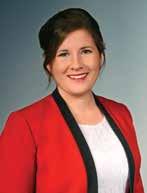
34 WISCONSIN FARM BUREAU FEDERATION Rural Route
SUPPLIED PHOTO SUPPLIED PHOTO
Spotlight on

YFA
Get to know the members who are leading Wisconsin Farm Bureau’s Young Farmer and Agriculturist Program.
Matthew and Lexi Cook, District 9 WFBF YFA Committee Representatives
Farm Bureau members since 2013, Lexi; 2022, Matthew

Why do you value your Farm Bureau membership?
We value our membership because it gives us a community of friends and family that are involved in the industry we love. We have had many great opportunities through Farm Bureau that have helped us grow individually and professionally, and we have met a lot of wonderful people.
What has been your favorite Farm Bureau program/event/ etc. and why?
The YFA Discussion Meet is one of our favorite parts of the YFA program. It is a great way to share ideas with others and work together to problem solve. The questions really make young members think about how Farm Bureau can affect their

local communities as well as what they can do as Farm Bureau members to achieve goals.
What would you tell YFA members about getting involved in the YFA program?

We would tell them to just go for it. We’ve met a lot of young farmers who don’t get involved with Farm Bureau because they don’t think it is for them or they won’t like it. You will never know if it is for you or if you’ll like it if you don’t give it a try. Getting involved can lead to new friends, opportunities and so much more.
Best words of advice/words of wisdom.
Our best advice is to try anything once. Volunteer on the local level or sign up for a conference or program you’re interested in. You never know what doors might be opened when you do.
District YFA Discussion Meets are in full swing throughout the state. Contestants are given a topic and then 25 minutes to discuss and develop solutions to the topic. The top three participants move on to the state contest held in conjunction with the WFBF Annual Meeting and YFA Conference in December.
YFA members have been busy attending district events and county activities this summer. Recently, District 2 YFA hosted a social at the Draft City Taproom in Baraboo during Farm Technology Days. Members enjoyed an evening of fun and networking.


35 wfbf.com AUGUST | SEPTEMBER 2023
The WFBF Young Farmer and Agriculturist Committee met in Eau Claire July 7-8, for their summer planning meeting. The group toured Chippewa Valley Bean and Leinenkugel’s Brewery and worked together to finalize the details for this year’s YFA Conference.
Random Lake Member Wins FFA Discussion Meet
Maria Lee of the Random Lake FFA Chapter was named the state winner of the Wisconsin FFA Discussion Meet Contest. The contest was held on June 13 at the 94th State Convention of the Wisconsin Association of FFA in Madison.

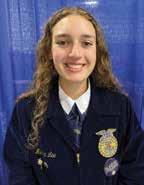
Lee’s advisor is Ms. Whitney Rathke.
The Discussion Meet tests the abilities of FFA members in cooperatively discussing agricultural issues, exchanging ideas and information, and finding solutions to issues or problems. Modeled after the Farm Bureau Discussion Meet, contestants give a 30-second opening statement, participate in 15-minutes of discussion and finish with a one-minute closing statement.
To qualify for the state finals, students must compete in several other contests including district contest, sectional
Big
Foot
contest, and finally the state semi-finals in Madison.
When asked why she decided to participate in the Discussion Meet, Maria said, “I love talking about current events and discussing solutions to issues we see in our agriculture community and making the world a better place. Through discussion and getting multiple perspective, we can make change.”
Maria added that winning the Discussion Meet, “means the world to me and it’s great to see how much work everyone has put in and bouncing ideas off one another has allowed me to learn so much.”
The other finalists were:
2nd Place: Allison Loosen, Slinger
3rd Place: Paige Billig, Marshall
4th Place: Olivia Horsfall, Fennimore
Wisconsin Farm Bureau Foundation sponsors the State FFA Discussion Meet Contest.
FFA Named Food for America Winner
he Big Foot FFA Chapter was named the state winner for their Food for America Program. Big Foot’s advisor is Lisa Konkel. Through the Food for America Program, FFA members educate elementary students about a variety of aspects of Wisconsin agriculture. The Wisconsin Farm Bureau Foundation’s Agriculture in the Classroom program sponsors the Food for America Program at the state level.
Big Foot FFA Chapter rose to the top with their communitycentric events and unique programs.
Big Foot FFA's Food for American program included a Discovery Barn, Elementary Agriscience Night, County Dairy Breakfast, Ag Research program, Pizza with Santa and a summer Agriscience Camp.
During the Walworth County Fair, thousands of fairgoers complete agriculture skill stations at the Discovery Barn. Three chapters work together to teach animal identification and care, beekeeping, poultry raising, and animal nutrition.
Agriscience Night was held at Fontana School during National FFA Week to share AgED pathways. There was more
Tthan 100 students exposed to various agricultural careers.
In conjunction with the county Farm Bureau, the chapter promotes the dairy industry at the dairy breakfast. Here thousands of residents discuss agriculture issues.
Agriscience research promotion was done at the regional Junior Science and Humanities Symposium in January and in May at the local Agriscience Fair. Members presented agriculture research to students and university personnel. The Agriscience Fair had 19 research projects presented to the community.
In December, the Pizza with Santa event educated hundreds of community families about the farm-to-table path for each pizza ingredient. With the summer Agriscience Camp in July, youth experience four Ag Ed pathways and a tour of a local production agriculture operation.
More than 50 chapters submitted applications detailing extensive agriculture literacy programs conducted by FFA Chapters from across the state. More than 66,000 students and community members were impacted by FFA member efforts to educate and inform students and their peers about modern agriculture.
The following are the Top 10 Gold Rated chapters in the State’s Food for America Award Program:
1st Place: Big Foot FFA
2nd Place: Waupun FFA
3rd Place: Milton FFA
4th Place: Pulaski FFA
5th Place: Manawa FFA
6th Place: Oconto Falls FFA
7th Place: Kiel FFA
8th Place: Denmark FFA
9th Place: Lake Mills FFA
10th Place: River Valley FFA
LEADERSHIP
36 WISCONSIN FARM BUREAU FEDERATION Rural Route
PHOTO CREDIT: WISCONSIN ASSOCIATION OF FFA
Send us YOUR Photos
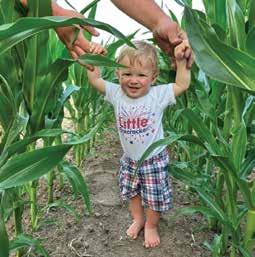







Wisconsin Farm Bureau members live and work with beautiful landscapes and livestock. On this page we highlight those sights and special moments. Please email your best photos (high resolution jpgs at 300 dpi) to Lsiekmann@wfbf.com Due to the high volume of photos we receive, we are unable to publish every photo. Photos sent in may be used in other WFBF publications.



37 wfbf.com AUGUST | SEPTEMBER 2023
Wilfert Farms, Two Rivers Haily Sand, Menomonie
Libby Knoebel, Helenville
Ethan Giebel, Lyndon Station
Kori Blank, Cashton
Dominique Madland, Lyndon Station
Nicole Laack, Plymouth
Whitney B., Green Bay
Emily Oates, Whitehall
Wisconsin Represented at National Convention

Wisconsin educators went ‘Beyond the Beaches’ at the 2023 National Agriculture in the Classroom Conference, June 25-29, in Orlando, Florida. More than 500 educators from across the country participated in the four-day conference which featured educational experiences at Florida farms and agribusinesses, dozens of hands-on workshops led by educators and volunteers and recognition of top educators and volunteers.
Wisconsin attendees were actively involved in this year’s conference with multiple award winners and workshop presenters. Jenn Scott, Food + Farm Exploration Center, and Chellen Wright, Marshfield School District, each led engaging workshops. Kim Pokorny from SAGES Elementary received a CHS Conference Scholarship, and Jessica Rettler from Tri-County Elementary was recognized as a National Excellence in Educating About Agriculture award-winner.
If you are interested in attending next year’s conference, ‘Agriculture Elevated’ in Salt Lake City, Utah, workshop proposals are now being accepted. Follow the Wisconsin Ag in the Classroom social pages for award and scholarship opportunities or visit wisagclassroom.org.


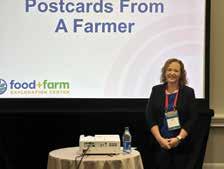
Essay Contest and Book of the Year Announced
Wisconsin Agriculture in the Classroom is excited to again sponsor the 2024 fourth- and fifth-grade Essay Contest. This year’s theme draws from Wisconsin’s sweetest commodities … fruit!
Strawberries, apples, cherries and of course, cranberries, are some of Wisconsin’s top fruit commodities. Sink your teeth into this year’s essay topic, and get the “Scoop on Wisconsin Fruit” at bit.ly/ wiagessaycontest.
Wisconsin Ag in the Classroom is excited to support the American Farm Bureau Foundation for Agriculture Book of the Year, I Love Strawberries by Shannon Anderson. In this accurate ag book, Jolie loves strawberries! Join Jolie as she learns what it takes to grow her own strawberries – persistence, responsibility and a little support from her friends and family take Jolie on a sweet journey to her very own strawberry patch.
Wisconsin Ag in the Classroom is excited to offer educator workshops this school year to help formal and informal educators learn more about this year’s essay topic. Workshops are supported by the CHS Next Generation Agriculture Leader grant and the National Ag in the Classroom Fire-Up grant. Learn more at wisagclassroom.org.

38 WISCONSIN FARM BUREAU FEDERATION Rural Route AG IN THE CLASSROOM
Tri-County Elementary educator, Jessica Rettler, received national recognition for her outstanding work in teaching within the context of agriculture.
(from left): Kim Pokorny from SAGES Elementary School; Jenn Scott, Food + Farm Exploration Center; Jessica Rettler, Tri-County Elementary; Hallie Kopczynski, Oconto Falls High School; Beth Schaefer, Wisconsin Agriculture in the Classroom.
Jenn Scott, Education Director for the Food + Farm Exploration Center, presented one of their new elementary lessons.
Chellen Wright, Special Educator with Marshfield School District, shared her tips and tricks for engaging her students with topics in agriculture.
Lessons Learned
By Faith Baerwolf, Wisconsin Ag in the Classroom Intern
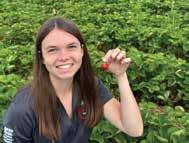

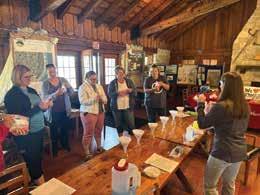

have always been interested in education and agriculture; however, I knew that teaching in a classroom was not for me. I was more than excited to be selected as the Wisconsin Agriculture in the Classroom intern since it combined my interests. My last seven months as intern have allowed me to see the wide range of career opportunities available involving education and agriculture. I have enjoyed working on a variety of projects during my internship that has helped me gain valuable experience and skills to use in my future career.
Throughout this internship, I have been managing the social media accounts for Wisconsin Ag in the Classroom. I have been able to help increase followers, reach, number of posts, as well as create a content calendar for the next 12 months. I assisted in the launch of the Wisconsin Ag in the Classroom Instagram account, @wiagclassroom, to increase our audience reach on different social media platforms.
One of the projects I completed was planning and designing a tri-fold brochure titled ‘Things you Should Know About Wisconsin Agriculture’. The brochure contains 2023 statistics and facts about Wisconsin agriculture. This free brochure is designed to be used with students and groups of all ages. Whether you were from an agricultural background or not, you could learn something new from the brochure.

I gained facilitation skills and presented my first workshop at the Wisconsin State FFA Convention. The one-hour program led students through the programs and resources Wisconsin Ag in the Classroom has to offer, as well as how to apply for the Food for America grant program to help fund their agricultural literacy events.
The experiences in this internship have been very diverse. In addition to major projects, I wrote scripts for the ‘Making You a Little Smarter’ radio advertisement program, helped pack teacher workshop kits, organize labs and support Summer
Educator Experiences, and taught more than 700 students about DNA at the Milwaukee Ag Discovery Day.
I have truly enjoyed this internship and getting to know all of the staff and members of the Wisconsin Farm Bureau. Thank you for the opportunity to grow awareness of agriculture while growing my own skills.

39 wfbf.com AUGUST | SEPTEMBER 2023
Captions
1. 'Things you Should Know About Wisconsin Agriculture brochure.
2. Ag Discovery Day in Milwaukee.
3. Wisconsin Social Studies Conference workshop.
4. Summer teacher workshop group at Point Beach State Forest.
I1 2 3 4 5
5. Strawberry DNA activity at the summer teacher workshop.
Fall Ag in the Classroom Rally
Friday, October 27
Radisson Hotel and Conference Center, Fond du Lac
Agenda
10:30 a.m. – New Coordinators Intro to Ag in the Classroom*
In-person OR virtual option (Must register for virtual option)

11:30 a.m – Registration and Lunch
12:00 p.m. – Welcome, Beth Schaefer
12:15 p.m. – Wisconsin Ag Literacy Trivia
Are you Smarter than a 4th-Grader? What's new in the classroom.
1:00 p.m. – Essay Experts Panel – Pro Tips for County Essay Contest, Volunteer Panel
Rebecca Poppy, Winnebago County
Tonra Degner, Juneau County
2:00 p.m. – Partnership Opportunities and Ideas, Panelists: Ag in ALL Classroom Grant Winners

3:00 p.m. – Make and Take Ideas for All Classrooms, Learn ag literacy by doing, and take it with you!
4:00 p.m. – Wrap-up and Dismiss
* New Coordinators Intro to Ag in the Classroom
Are you in your first 1-5 years of being an Ag in the Classroom chair? Plan to attend the new, Intro to Ag in the Classroom session before the Fall Rally kicks-off! Join inperson or virtually to learn the ins-and-outs of serving as a county Ag in the Classroom chair.
Leadership
Training Series
Brought to you by the WFBF Promotion and Education Committee
Saturday, October 28
Radisson Hotel and Conference Center, Fond du Lac
Storytelling Strategies

9:00 a.m. – Welcome
9:15 a.m. – Opening Keynote, Lady Farmer Darci Daniels
10:30 a.m. – Sustainable Storytelling Panel Panelists: 35 Under 35 Finalists
12:00 p.m. – Lunch (provided)
1:15 p.m. – Gather Wisconsin Masterminds, Cassie Sonnentag
2:30 p.m. – Closing Comments
LaClare Family Creamery Tour and Dinner
For those attending the Ag in the Classroom Training on Oct. 27 or traveling the night before, join us Friday evening for a tour and meal at LaClare Family Creamery. Learn about the cheeses and cheesemaking operations and enjoy dinner featuring artisan cheeses. Advance registration is required and an additional $15 fee applies.
LaClare Tour and Dinner Schedule
Friday, October 27
Before 5:00 p.m. - Explore the visitor center on your own
5:00 p.m. - Welcome and Cheese Tasting
5:30 p.m. - Dinner
6:30 p.m. - Tour and Discussion
Hotel Information
A block of rooms is being held for Friday night at the Radisson Hotel, 625 Rolling Meadows Drive, Fond du Lac. Call 920.923.1440 and ask for the 'WI Farm Bureau Foundation' room block. Rooms must be reserved by Oct. 1 to receive the discounted $129+tax rate.

Registration
$20 for one day only or $30 for both trainings. Additional $15 for the LaClare Tour and Dinner. Register online at bit.ly/FallWorkshops2023. Registration deadline is Oct. 16.
40 WISCONSIN FARM BUREAU FEDERATION Rural
Route
Promotion
Wisconsin Farm Bureau® Program and Education



41 wfbf.com AUGUST | SEPTEMBER 2023


FOUNDATION
Gather Your Donations Now For the Silent Auction
The Wisconsin Farm Bureau Foundation Silent Auction will be back to help to raise funds for agricultural education and leadership programs. The funds raised are used to support the Ag in the Classroom, Young Farmer and Agriculturist, Promotion and Education, Collegiate Farm Bureau and WFBF Leadership Institute programs. What is popular to donate? Gift baskets, theme baskets, sports related, gift certificates, Wisconsin products, kid’s items
or baskets, homemade items, sampling of items from your county, hotel or event certificates, experiences and the list can go on.

If you are attending the WFBF Annual Meeting, you can simply bring your item along to the meeting. We request that you complete the online donation form at bit.ly/fbsilentauction23 by Nov. 20.
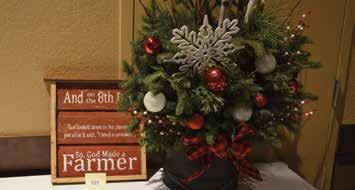

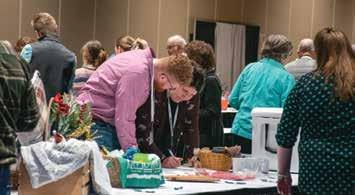
to the Following WFB Foundation

• Cassie Hartje in honor of John Hromyak
• Dodge County Farm Bureau in memory of Claude Rex
• Dan and Julie Merk in memory of Michael Adler
• Joseph Kaczmarek in memory of Jean Kaczmarek
Thank You Foundation About
Donors: (Donations were made between June 3 and July 31, 2023)
• Stan Kaczmarek and Kathy Duescher in memory of Jean Kaczmarek
• Katie Mattison in memory of Robyn Lulich
• Green Lake County Farm Bureau in memory of Adeline Abel
• Dunn County Farm Bureau in memory of Randy Grossbier
the
The Wisconsin Farm Bureau Foundation was established in 1988 to provide support for agricultural education and leadership programs. Through donations and other contributions, the foundation invests time and resources to support the next generation of agriculturists.
44 WISCONSIN FARM BUREAU FEDERATION Rural Route
Counseling, Is it for Me?
By Karen Endres, Farmer Wellness Program Coordinator, Wisconsin Farm Center
Daily farm stress is nothing new for farmers and their families, and not all stress is bad. Generally, stress is a signal telling us that we need to make a change.
In agriculture, many of the daily stressors we encounter are out of our control, like the weather, unpredictable markets and economic uncertainties.
According to John Shutske, Ph.D., an Agricultural Safety and Health Specialist at UW-Madison Professor and UW Extension, “It is important to note that ‘feeling stressed’ is not a sign of weakness or that we lack an ability to cope with daily life. The stress response that occurs when we encounter a threat changes our body and brain chemistry as the body is triggered.”
There can come a time for many of us when farm stress can feel like too much, to the point where it impacts our decision making, physical health, relationships and sleep. When a person experiences these symptoms, it’s time to look to a professional for help.
“Many people think that to talk to a counselor, you need to be diagnosed with a mental illness, and that couldn’t be further from the truth,” said Jes Beauchamp, Tele-Counselor and Licensed Clinical Social Worker and a service provider to the Wisconsin Department of Agriculture, Trade and Consumer Protection. “Counselors are trained to listen and help you when the stress is too much.”
Yet, there is still a stigma around mental health, which is why many people don’t seek help. A 2019 American Farm Bureau Federation study revealed that a majority of farmers and farmworkers think the media (72%), people in their local community (58%), and their friends (56%) attach at least a fair amount of stigma to mental health.
DATCP’s Wisconsin Farm Center is working with UW Division of Extension, Wisconsin Farm Bureau and many other organizations to help break down the stigma of seeking assistance and to make it easy for farmers to access counseling resources.
“We developed our Farmer Wellness Program knowing that affordability, accessibility, acceptability and awareness can be a barrier to farmers and their families accessing services,” said Karen Endres, Farmer Wellness Program Coordinator for the Wisconsin Farm Center. “Farmers have shared with us that other barriers in seeking treatment include the cost of appointments, embarrassment, not knowing how to find a counselor and awareness of mental health.”
The Farm Center offers Wisconsin farmers and their families a 24/7 wellness helpline (1.888.901.2558), tele-counseling, counseling vouchers and online support groups. The Farm Center has counselors in their network that specialize in

substance use, anxiety, depression, family relationships and much more.
“Everyone’s situation is unique, and our dedicated staff work to find which resource is best. If it is counseling, we go the extra mile and find the best fit within our strong network of counselors,” said Endres.
Once the Farm Center has shared counseling options with you, all you need to do is make a call to set-up an appointment. With your permission, counseling vouchers can be sent directly to the provider and your appointment cost will be fully covered. The number and frequency of those sessions is between you and your counseling provider.
For many people, fear of the unknown looms large. Farm Center staff are often asked, “what is a session with a counselor like?” Sessions can seem intimidating but are really just an opportunity for you to share as much or as little as you want.
“We don’t ask you to share all your secrets,” said Beauchamp. “We start off the conversation getting to know each other and then talk about things that are bothering you.”
Of course, not every discussion is easy, and some can bring forth a lot of emotions. Difficult conversations are important to have, however, and can help you gain a different perspective.
“Often, we are so engrained in our behaviors that we don’t even realize how they impact others, or that there is another way to be,” said Beauchamp.
Mental health is just as important as physical health, and the two are often intertwined. Remember to set aside time to take care of yourself and that the Wisconsin Farm Center is there when you need it, providing services that are both free and confidential.
“When looking for advice for your farm, you seek out the best professional you can find. The same should be done when it comes to your mental health,” said Endres. “A healthy farmer equals a healthy farm, so reach out to the Wisconsin Farm Center for assistance and to find the best possible person to talk to.”
45 wfbf.com AUGUST | SEPTEMBER 2023 RURAL MUTUAL
RURAL MUTUAL Rollovers Can Happen Fast
By Bruce Kyes, Loss Control Consultant
The Village of Cadott’s siren suddenly broke the quiet one late-fall afternoon. Back in the 1970s, the siren notified the Cadott-Goetz-Sigel Volunteer Fire Department (and everybody else in town) that either a fire or some other emergency was in progress.
My dad and I were just coming in from the fields. He was a volunteer on the fire department. When he headed for the pickup truck, I jumped in with him.
The ambulance already passed by the time we made it to the Highway 27 corner. With our pickup truck flashers on, we joined the convoy of others on the department following the ambulance north. Based on how fast we were going, I remember my dad saying it might be a bad one.
When we came up to the driveway, several cars and pickups were already parked. Dad and I ran over to where the ambulance had parked by a garage.
The farmer’s garage was built next to a steep ravine. At the bottom of the ravine was an up-side-down tractor and end loader with the farmer still pinned underneath. In one big motion, the assembled group of neighbors and rescue volunteers rolled the tractor off the farmer and held it so the ambulance crew could move him from underneath. Once he was clear, everyone soon realized it was too late. A quiet overcame the scene.
It happened fast. The recently retired farmer was leveling off some backfill around his new garage. The tractor tracks showed where the rear tire got too close to the soft edge. The overturned tractor crushed and pinned him underneath. This was a tragedy in so many ways.
Just recently, I was reminded of that sad day when a text from a friend showed up on my phone. The text had a picture of small tractor and end loader nearly turned up-side-down on a steep hill. My friend’s retired neighbor was moving fill material, bucket-by-bucket, along a path on a steep hill. With the bucket raised high, he hit a bump and the tractor rolled down the bank.

Fortunately, this story had a much different ending. There were no sirens, speeding ambulances, rescue volunteers or gathered neighbors. The retired neighbor was able to walk away from the tipped tractor without a scratch. The rollbar on the tractor kept the unit from going all the way over. He was also wearing the tractor’s seatbelt, so he wasn’t ‘thrown’ underneath the tractor or the rollbar when it came down. The rollbar worked so well, even the tractor was undamaged.
It still happens fast. Tractors with end loaders are still dangerous and can roll over quickly. But what’s different today is tractor rollover protection and seatbelts can prevent tragedies when used. This was certainly proven with my friend’s neighbor’s experience.
When paired with a seatbelt, Rollover Protective Structures (ROPS) are 99% effective in preventing injury or death in the
event of an overturn. Tractor overturns are the most frequent cause of death on farms even today. Most farmers think it will never happen to them. But even if you abide by every safety protocol – remaining focused, not going too fast, and keeping young children out of the way – rollover incidents can, and do, happen.
Farmers work so hard and this is a proven technology that can save you in case of an overturn. You don’t want to say, “if only.”: “If only I had put on the ROPS and my seatbelt”, “If only I could have prevented this.” All it takes is some uneven terrain for an incident to change a life forever.
Farm tractors without proper protection are still present on many farms. Unprotected tractors can be retrofitted with mounted rollbars and seat belts. The National Farm Medicine Center’s ROPS rebate program offers approximately 70% in rebates for rollover protection installation on unprotected tractors. Cost is still one of the main reasons farmers hesitate to purchase and install a ROPS but ask yourself what price a life is worth.
Call the ROPS hotline at 877-ROPS-R4U or visit www. ropsr4u.com. Hotline staff will research all ROPS options for your tractor’s make and model, as well as provide estimated costs and sources for purchasing a ROPS.
Save a life. Protect yourself and your family and install a ROPS today.
46 WISCONSIN FARM BUREAU FEDERATION Rural Route
Connect with Rural Mutual Insurance @RuralMutual @RuralMutual @Rural.Mutual @Rural Mutual Insurance Company www.RuralMutual.com




















 By Tyler Wenzlaff
By Tyler Wenzlaff




 Members met with Sen. Baldwin while visiting Washington, D.C.
Members met with Rep. Gallagher's staff member Dan Butler.
The group stood for a photo with Sen. Johnson after meeting with him and his staff.
Members met with Rep. Van Orden's staff member Claire Osborn.
WFBF Board Directors Dave Daniels and Joe Bragger met the Ukrainian Ambassador.
By Tim Fiocchi
Members met with Sen. Baldwin while visiting Washington, D.C.
Members met with Rep. Gallagher's staff member Dan Butler.
The group stood for a photo with Sen. Johnson after meeting with him and his staff.
Members met with Rep. Van Orden's staff member Claire Osborn.
WFBF Board Directors Dave Daniels and Joe Bragger met the Ukrainian Ambassador.
By Tim Fiocchi




































































 be displayed at other events throughout
be displayed at other events throughout









































































